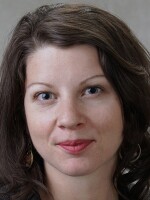AILSA CHANG, HOST:
The Seneca language is on the brink of extinction. It is one of hundreds of Native American languages and cultures that Indian boarding schools sought to annihilate. Member station WXXI's Noelle Evans tells us about some Seneca people in western New York who are fighting to save their language from oblivion.
NOELLE E. C. EVANS, BYLINE: Jamie Jacobs began learning the intricacies of Seneca language in the early 2000s on the Tonawanda Territory, near Buffalo. It was how he and his great grandmother used to connect. Sometimes she would translate recordings of her father, his great-great-grandfather, singing.
(SOUNDBITE OF MUSIC)
EDWARD BLACK: (Singing in Seneca).
JAMIE JACOBS: That gave me a lot of deeper insight into the way that our ancestors understood the world. And it's a little bit different than how we understood it growing up, even though we grew up as Senecas.
(SOUNDBITE OF MUSIC)
BLACK: (Singing in Seneca).
EVANS: But there are at least two generations in his family who do not speak Seneca. It's partly a result of Indian boarding schools that Native American children were compelled to attend. There, students were abused and brutally punished for speaking their native language.
JACOBS: I do remember my great grandmother telling stories because her brothers and sisters were sent to boarding school. You know, they were sent to the Thomas Indian School in Cattaraugus, so that cut off this holistic way of, you know, handing down language.
EVANS: Those acts of violence separated indigenous children not just physically from their families, but emotionally and spiritually from their cultures - cultures that are cemented in those very languages that were literally beaten out of young children.
Today, the Endangered Languages Project says there are fewer than 50 fluent native Seneca speakers left, but that could change. For the last 20 years, the Tonawanda Seneca Nation office has been transformed into a part-time language school for children.
(SOUNDBITE OF BUSY CLASSROOM AMBIENCE)
EVANS: About six years ago, that expanded into adult classes.
JAYDEN PARKER: (Speaking Seneca).
EVANS: The most advanced student here is Jadyen Parker. In a way, he is fulfilling a childhood wish.
PARKER: I grew up with a lot of older people, so they all spoke language, so I wanted to be able to speak with them, too, and understand what they were saying and then have them understand me as well.
EVANS: He's trying to preserve the language in part by transcribing recordings of native speakers, including speeches by the late Chief Corbett Sundown. Sundown was one of the last fluent speakers of Seneca. He worked with a linguist to create resources to protect the language.
(SOUNDBITE OF ARCHIVED RECORDING)
CORBETT SUNDOWN: (Speaking Seneca).
EVANS: Parker's teacher, Wayne Abrams, says one of Sundown's reasons was personal.
WAYNE ABRAMS: He says that he's recording all these things, he says, 'cause what he thinks is that, when he dies, that there's going to be no one to speak at his funeral.
EVANS: Without the Seneca language, an entire unique worldview could be lost. Some ceremonies have already disappeared. For Jamie Jacobs, reconnecting to his heritage like this has led to unearthing moments in history that are, in a way, still alive today.
JACOBS: There's words for things we have that our ancestors didn't have 200 years ago. So we didn't have coins, but we have a word for a coin - o:wi:sda'.
EVANS: Jacobs had come across that word in a Jesuit dictionary from the 17th century. He found that o:wi:sda' was already the word for fish scale.
JACOBS: So our ancestors had to descale fish, and they used fish skin for different things. So now when I say the word for o:wi:sda', I don't just picture a silver coin. I picture a fish scale, and I picture my ancestors descaling fish, and I picture them doing all these things. And that gives me a lot of pride, and it gives me a lot of inspiration.
EVANS: Each word he learns comes with a deepening sense of connection - to himself, to his community, his ancestors, but also to the world at large.
JACOBS: I think that if more people just understood our language - you know, even just have a general sense of how it works and how we think, well, then I think more people would be more open and fascinated to learn about who we are.
(SOUNDBITE OF MUSIC)
BLACK: (Singing in Seneca).
EVANS: Through Seneca language, Jacobs has found continuity with a way of life that was taken away from him and others. For NPR News, I'm Noelle Evans.
(SOUNDBITE OF MUSIC) Transcript provided by NPR, Copyright NPR.


